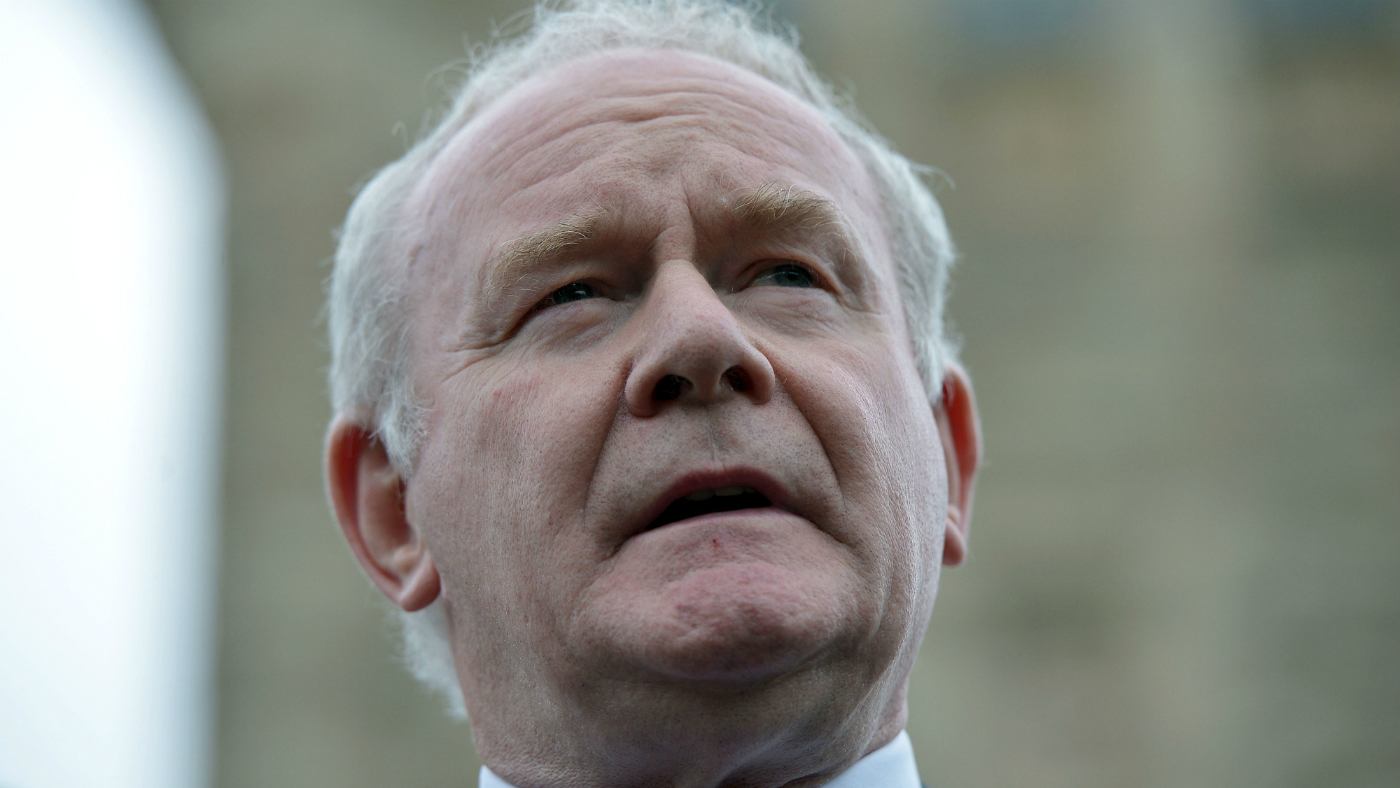Former IRA commander Martin McGuinness dies
Gerry Adams leads the tributes to the divisive paramilitary who helped 'pave the way for peace' in Northern Ireland

A free daily email with the biggest news stories of the day – and the best features from TheWeek.com
You are now subscribed
Your newsletter sign-up was successful
Former Sinn Fein leader and deputy first minister of Northern Ireland Martin McGuinness has died at the age of 66.
He "had been receiving treatment for a rare health condition", the Irish Times reports, and stepped back from politics in January.
Sinn Fein president Gerry Adams, a friend of McGuinness, spoke of his "deep regret and sadness" at the news.
The Week
Escape your echo chamber. Get the facts behind the news, plus analysis from multiple perspectives.

Sign up for The Week's Free Newsletters
From our morning news briefing to a weekly Good News Newsletter, get the best of The Week delivered directly to your inbox.
From our morning news briefing to a weekly Good News Newsletter, get the best of The Week delivered directly to your inbox.
"He was a passionate republican who worked tirelessly for peace and reconciliation. He will be sorely missed by all who knew him," he said.
The Daily Telegraph describes the former IRA chief, who worked at the heart of the power-sharing government following the 1998 Good Friday Agreement, as "the ruthless paramilitary leader who helped pave the way for peace in the province and the hard-line Republican who was happy to shake the Queen's hand and share a joke with her."
He had been "long vilified in Britain for his commitment to the IRA's 'armed struggle'," adds the paper, adding that "at one stage it was alleged that he was a member of the seven-man IRA Army Council".
McGuinness was also accused of knowing in advance that IRA bombers were planning to attack the Enniskillen Remembrance Day service in 1987 – an allegation he denied.
A free daily email with the biggest news stories of the day – and the best features from TheWeek.com
Aged 21, he was second-in-command of the IRA during Bloody Sunday in 1972, when British soldiers killed 14 civil rights protesters in Londonderry. He also served two prison sentences in the Republic of Ireland for terrorist offences.
The BBC says "his leadership potential was spotted early and he was just 22 years old when he and Gerry Adams were flown to London for secret talks with the British government. MI5 considered him serious officer material with strategic vision".
More than 25 years later, that assessment proved correct as McGuinness was chief negotiator in the Northern Ireland peace process.
He became deputy first minister of the province in 2007, working alongside arch-unionist Rev Ian Paisley.
"The two forged an unlikely alliance," says the BBC. They even came to be known as the "Chuckle brothers".
In recent years, McGuinness turned away from the actions of his past, saying: "My war is over. My job as a political leader is to prevent that war and I feel very passionate about it."
A divisive figure
Prime Minister Theresa May said in a statement that "[McGuinness] strove to make Northern Ireland a better place for everyone, regardless of background or tradition," while Labour leader Jeremy Corbyn called McGuinness a "a great family man".
First Minister of Northern Ireland Arlene Foster, under whom McGuinness served as deputy leader, said: "History will record differing views and opinions on the role Martin McGuinness played throughout the recent and not-so-recent past. But history will also show that his contribution to the political and peace process was significant."
Former Conservative MP Lord Tebbit, who was injured in the IRA's 1984 bombing of the Grand Hotel in Brighton along with his wife, was highly critical of McGuinness.
"The world is now a sweeter and cleaner place," Lord Tebbit told ITV's Good Morning Britain."He was a coward. The reason he suddenly became a man of peace, was that he was desperately afraid that he was going to be arrested and charged with a number of murders."
Jim Allister, head of Northern Irish political party Traditional Unionist Voice (TUV), was equally damning: "My primary thoughts are with the many victims of the IRA who never got to the age of 66, who never saw their grandchildren because McGuinness's IRA snuffed out so many lives.
"Whatever became of Martin McGuinness I will not be a party to white-washing the vile, vicious, wicked terrorism he brought to our streets."
-
 Film reviews: ‘Send Help’ and ‘Private Life’
Film reviews: ‘Send Help’ and ‘Private Life’Feature An office doormat is stranded alone with her awful boss and a frazzled therapist turns amateur murder investigator
-
 Movies to watch in February
Movies to watch in Februarythe week recommends Time travelers, multiverse hoppers and an Iraqi parable highlight this month’s offerings during the depths of winter
-
 ICE’s facial scanning is the tip of the surveillance iceberg
ICE’s facial scanning is the tip of the surveillance icebergIN THE SPOTLIGHT Federal troops are increasingly turning to high-tech tracking tools that push the boundaries of personal privacy
-
 The high street: Britain’s next political battleground?
The high street: Britain’s next political battleground?In the Spotlight Mass closure of shops and influx of organised crime are fuelling voter anger, and offer an opening for Reform UK
-
 Is a Reform-Tory pact becoming more likely?
Is a Reform-Tory pact becoming more likely?Today’s Big Question Nigel Farage’s party is ahead in the polls but still falls well short of a Commons majority, while Conservatives are still losing MPs to Reform
-
 Taking the low road: why the SNP is still standing strong
Taking the low road: why the SNP is still standing strongTalking Point Party is on track for a fifth consecutive victory in May’s Holyrood election, despite controversies and plummeting support
-
 What difference will the 'historic' UK-Germany treaty make?
What difference will the 'historic' UK-Germany treaty make?Today's Big Question Europe's two biggest economies sign first treaty since WWII, underscoring 'triangle alliance' with France amid growing Russian threat and US distance
-
 Is the G7 still relevant?
Is the G7 still relevant?Talking Point Donald Trump's early departure cast a shadow over this week's meeting of the world's major democracies
-
 Angela Rayner: Labour's next leader?
Angela Rayner: Labour's next leader?Today's Big Question A leaked memo has sparked speculation that the deputy PM is positioning herself as the left-of-centre alternative to Keir Starmer
-
 Is Starmer's plan to send migrants overseas Rwanda 2.0?
Is Starmer's plan to send migrants overseas Rwanda 2.0?Today's Big Question Failed asylum seekers could be removed to Balkan nations under new government plans
-
 Has Starmer put Britain back on the world stage?
Has Starmer put Britain back on the world stage?Talking Point UK takes leading role in Europe on Ukraine and Starmer praised as credible 'bridge' with the US under Trump